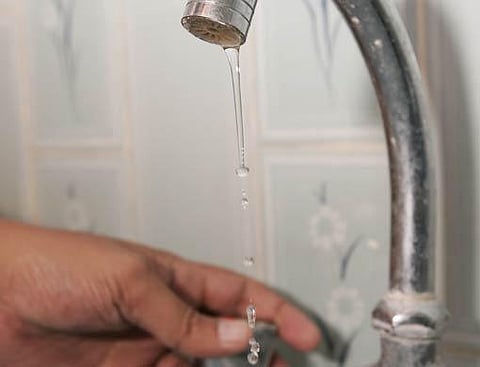Experts reveal shocking details of water abuse at Dubai mosques
Hidden cameras show extent of wastage from taps in ablution areas at three Dubai mosques

Dubai: Hidden cameras placed at three Dubai mosques have revealed the extent to which water is wasted from fast-flowing taps in wudu or ablution areas.
The cameras were set up as part of an experiment by an official at the Islamic Affairs and Charitable Activities Department — which propagates Islamic culture and develops religious awareness — to see first-hand how water is consumed by devotees.
Litres of water are left to pour down the drain while people remove socks and shoes, chat, with some even taking a long-time to perform wudu.
"It is absolutely shocking to see people consuming water during ablution in this manner. There is an unnecessary overconsumption of water, which is not in line with our faith as Muslims and in our traditions," said Mohammad Abed Al Wadood, Electricity Projects Supervisor at Islamic Affairs and Charitable Activities Department (IACAD).
Al Wadood said his department is trying to devise cost-effective solutions to reduce water consumption during wudu.
For the past three years, IACAD has installed aerators — a small circular device affixed to faucets to reduce water-flow while maintaining air pressure — to try and reduce water consumption by a reputed 60 per cent.
"A change in how people perceive water consumption is necessary. Having access to water in ablution areas doesn't necessary mean we have to abuse it. Placing expensive hi-tech equipment will help but people's perception towards it is much more important," he said. The footage has shown the harsh reality of "negligence from the public on the importance of sensible usage of water", Al Wadood said.
Rais Ahmad Patel, an Indian mechanical engineer based in Dubai for the past 13 years has always tried to advocate water conservation practices to everyone around him.
When he arrived in 1997, the UAE's per capita water consumption was pegged at about 500 litres per person per day. In 2010, this figure has risen to 550 litres per person per day.At the mosque, Patel was often met with a shrug and a stare when he tried to explain to the men around him performing ablutions that it would be wise to turn off the tap when not in use.
Yet four years ago he launched an initiative at the Abu Hail mosque in Dubai, owned by Sultan Bin Khalifa Al Habtoor, and with his support inserted conical plastic tubes usually used for silicon waterproofing showers or basins, into the pipes of the mosque's 36 taps to reduce their water flow.
No complaints
"We have received no complaints," said Patel of his home-made device, "but when opened at full force the amount of water released is halved."
According to Patel's calculations and research, around 1,000 people go to the mosque on a daily basis and use up to three litres of water. His device can save up to 600 litres of water a day which over a month, taking into consideration that some people perform purification rites at home before attending prayers, saves approximately 19,200 litres of water a month.
Hotels and malls have now adopted similar devices to reduce water but these can get clogged with sand or particles and can be easily removed by users, Patel said. IACAD has distributed pamphlets while trying to pass on the message every once in a while during Friday sermons.
The current plan is to create more awareness in schools and mosques, Al Wadood said, while adding that they are considering using the video footage as an example.
Al Wadood and Patel are working towards the same goal of reducing water consumption in Dubai. Unfortunately these ideas may only see the light of day in 2011 with Patel's mosque retrofit estimated to cost Dh20,000 per mosque.
Know-how: Steps for ablution
1. Wash the hands up to the wrist three times.
2. Rinse out the mouth with water three times.
3. Cleanse the nostrils by sniffing water into them and blowing it out three times.
4. Wash the face three times with both hands — from the top of the forehead to the bottom of the chin, from ear-to-ear.
5. Wash the right arm three times up to the top of the elbow, then wash the left arm.
6. Wipe the whole head from the forehead to the back of the neck one time with a wet hand.
7. With wet fingers, wipe the inner sides of the ears with the forefingers and their outer sides with the thumbs.
8. Wipe the feet up to the ankles, three times, beginning with the right foot.
Save water: Narrating Hadith
Aside from creating a water-flow reduction mechanism for mosques' ablution areas, Rais Ahmad Patel, an Indian mechanical engineer based in Dubai has come up with the idea of narrating Hadith on water conservation while the faithful gather to perform purification rites.
A 10-minute announcement in four languages retelling some of the Hadith on ablution and preserving natural resources played after the call to prayer, could improve sustainable water use, said Patel.
While still in the research and development phase, awareness is the only way to help people change their ways, he said.
Sign up for the Daily Briefing
Get the latest news and updates straight to your inbox


